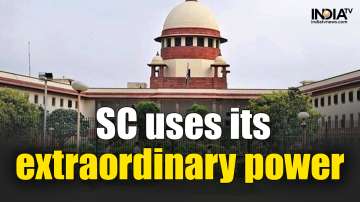The Supreme Court of India has reinforced the importance of Article 142 which empowers the court to pass such orders as are necessary for the dispensation of absolute justice in pending cases. Recent judgments have laid down important guidelines for interim orders and standards for the application of rights under this Article, emphasising impartiality and the protection of fundamental rights. In a separate case, the court intervened to get a Dalit youth admitted to IIT Dhanbad. reflecting its commitment to tackling economic inequality.
Article 142: Ensuring complete justice
Article 142 of the Constitution of India empowers the apex court to pass any decree or order necessary to secure full justice in any matter within its jurisdiction. Over the years, the interpretation of this article has evolved through important judicial precedents, which have provided important guidelines for the development of the judicial process.
Key guidelines set by the Supreme Court
Recent decisions of the Supreme Court set out the basic principles for the implementation of Article 142.
1. Vacation of interim orders: Before vacating these orders to ensure that justice is done, the court should examine the merits of the case and the rights of the parties concerned. Over time, temporary orders will go nowhere.
2. Authorisation guidelines:
Judgment: Under Article 142, the court may exercise the powers to ensure complete justice but it cannot overturn a valid judicial order affecting other litigants in different jurisdictions.
Fundamental rights: The court must respect the rights of the plaintiff and must not violate the laws within its jurisdiction.
Natural Justice - The principles of natural justice must be observed to ensure that the trial court has the right to be heard before entering any unfair order, including a stay of proceedings order.
These guidelines outline a progressive approach to the exercise of judicial power, focusing on competence, substantive rights and impartiality in legal proceedings.
Citing the case: Supreme Court intervened for Dalit youth
In a recent case, the Supreme Court intervened to allow a Dalit youth, Atul Kumar, to gain admission to IIT Dhanbad after he missed the fee deadline by minutes. Applying Article 142, the court held that "a knowledgeable student should not be left confused".
Kumar's subsequent saving of the money was due to his family's financial difficulties. The Court emphasised that it is unfair to allow a student to receive an education in such circumstances. With consequential benefits including hotel accommodation, the bench directed IIT Dhanbad to admit Kumar to a course in electrical engineering.
Conclusion impact of Indian legal environment
The apex court's interpretations of Article 142 reinforce its commitment to social justice and equality by clarifying judicial powers. These developments are crucial in addressing systemic barriers to education and ensuring justice for marginalised communities as India goes through a boom in legal literacy.
Also read | PM Modi appeals people to vote in J-K third phase elections: 'Make festival of democracy a success'
Latest India News
